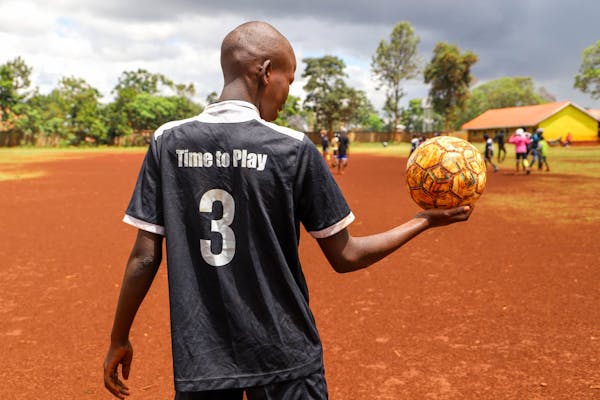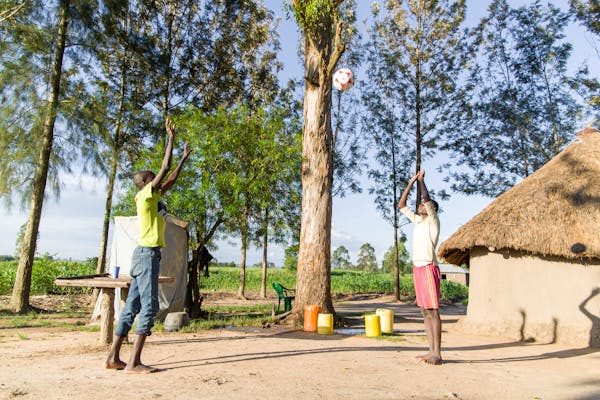Kenya

Kenya
Protecting children in a challenging environment
Kenya is a lower middle-income country with a total population of 56.2 million people and over 37 million children population. With its high population and poverty rates, Kenya faces challenges in the provision of services and access to social amenities including access to good health, quality education, food and other basics.
Children living in poverty are vulnerable to sexual exploitation, child labour and child trafficking, forced marriage, abuse as well as other forms of exploitation.
-

Magdalene Wanza
Country Director, Kenya, Terre des Hommes NetherlandsChild exploitation is both a cause and consequence of poverty, reinforcing social inequality and discrimination. Elimination of exploitation of children starts with everyone, but primarilywith our leaders and governments.

Children in Kenya
Kenya is a lower middle-income country with a total population of 56.2 million people and over 37 million children population. With its high population and poverty rates, Kenya faces challenges in the provision of services and access to social amenities including access to good health, quality education, food and other basics.
Children living in poverty are vulnerable to sexual exploitation, child labour and child trafficking, forced marriage, abuse as well as other forms of exploitation.
Our approach: Children at the centre
Children are at the centre of everything we do. We support them to get access to education and other skills development so they can eventually find jobs to earn better incomes to enhance their opportunities to live a decent and dignified life. We build their resilience and facilitate their empowerment. And we help them amplify their voice, opening opportunities to speak up to those with the power to realise systemic change.
Strengthening child protection
- We educate parents and communities.
- We build the capacity of local structures to effectively prevent, detect, report and respond to child exploitation.
- We collaborate with other actors to influence strengthening of the legal and policy environment for better promotion and protection of children’s rights.
Our work in Kenya
We work with communities, government, private sectors, civil society organisations and children themselves, at the centre, to address systematic and structural drivers that expose children to exploitation. Our work focuses on curbing sexual exploitation of children, child labour and child exploitation in humanitarian settings.
Sexual Exploitation of Children
Kenya is a source, transit and destination country for human and child trafficking. Children are mostly trafficked for sexual exploitation both within and outside the country. Many children, mostly girls, are forced to work in prostitution at a young age in bars, hotels, brothels and along the road.
Sexual exploitation of children happens not only offline, but increasingly online as well. Online child sexual exploitation (OCSE) has globally seen a significant surge over the last number of years, only to be exacerbated by the COVID-19 pandemic. Recently we have noticed an increase in OCSE in Kenya.
Child Labour
Three out of ten Kenyan children have to work to survive. They live in deep poverty and are forced to do heavy and dangerous work. Children spend long days doing work that is not appropriate for their age and even puts them at risk, for example when they have to handle dangerous tools or toxic substances, chemicals and pesticides. They work as motorbike drivers, in hotels, food stalls, in the market, in construction or in housekeeping.
Humanitarian Action
Kenya is host to a large refugee and asylum seekers community. About 87% of them are displaced from neighbouring countries Somalia and South Sudan. The majority has found shelter in Dadaab and Kakuma camps in the north of the country.4 Living in refugee settlements exposes children to violence, abuse and exploitation. Strengthening child protection systems, both in the refugee and the host communities, is key.
Kenya is also prone to extreme drought, jeopardising the livelihood and food security of many. In these circumstances, children become more vulnerable to trafficking for labour or sexual exploitation. Our drought response focuses on food security and livelihood conservation, as well as ensuring children are well protected.
Gender Equality
Discriminative gender- and age-related social norms deny and restrict girls and young women the space to fully participate in society. We welcome and facilitate girl-led and youth-led activism that challenges gender inequality, exclusion and injustice.
In close partnership, we work to increase sustained influence of girls and young women on decision-making and the transformation of gender norms in formal and informal institutions.
Our partners in Kenya
Terre des Hommes Netherlands is part of:
- the Joining Forces for Children, an alliance of the six largest child-focused international NGOs;
- and She Leads, a five-year strategic partnership between the Dutch Ministry of Foreign Affairs and four consortium organisations- Terre des Hommes Netherlands, Plan Netherlands, DCI-ECPAT Netherlands and the African Women´s Development and Communication Network (FEMNET).
In our work, we closely collaborate with the Government of Kenya’s key ministries/departments, UN agencies and with other CSOs.

We collaborate closely with local organisations namely:
African Gender and Media Initiative Trust (GEM Trust)
The African Gender and Media Initiative Trust (GEM) is a research organisation that works to advance gender equality through research and action on women’s human rights. GEM brings together women experts in women’s human rights issues specifically women’s health, sexual and reproductive rights, economic empowerment, media, advocacy, and research.
GEM Trust’s focus issues include -Sexual Reproductive Health and Rights, Gender-Based Violence, Economic Justice and New media. GEM is currently working in five Counties in Kenya, with its priority population being girls and women, men, and boys. GEM’s work focuses on community interventions for awareness-raising on the focus areas, linking the priority populations to health, psychosocial and legal services, and working with duty bearers to enhance the legal and policy environment through policy advocacy at County, National, Regional, and International policy advocacy.
Childline Kenya
Childline Kenya works in partnership with the Government to stop child abuse and provide a safe environment for all children. To this end, Childline operates the only nationwide helpline service (116) dedicated to children that runs 24 hours toll-free in Kenya. Terre des Hommes Netherlands partners with Childline Kenya in the Safe Online project which focuses on online child sexual exploitation, and in activities where specialised counselling services are required.
KNOTE
K-NOTE was founded in March 2003 and is currently operating in Naivasha, Gilgil, Subukia and Bahati Sub Counties of Nakuru County. K-NOTE´s vision statement is ´A Healthy Wealthy Society´ and its mission is to meaningfully engage the community in improving health and economic development towards a sustainable future. Since its inception, K-NOTE has reached the most vulnerable groups such as youth, women, orphans and vulnerable children, adolescents, children and youth living with disabilities and key populations in their efforts towards sustainable development through addressing public health concerns, livelihood security and poverty alleviation strategies. Terre des Hommes Netherlands partners with K-NOTE to implement the CSEC project in Naivasha.
The Network for Adolescent and Youth of Africa (NAYA)
The Network for Adolescent and Youth of Africa (NAYA) is a youth-led regional advocacy network founded in October 2001 by the African Regional Office of the Planned Parenthood Federation of America (PPFA). NAYA aims at enhancing the capacity of youth advocates, young people, youth-led organisations and policymakers to undertake Sexual and Reproductive Health and Rights (SRHR) advocacy at international, regional, national and counties in Kenya to improve the quality, affordability and accessibility of health including SRHR information and services.
Investing in Children and their Societies (ICS-SP)
Investing in Children and their Societies (ICS-SP) is an African child and family development organisation, raising awareness, providing insights, developing, implementing and scaling up evidence-based solutions that tackle root causes of violence, poverty, and inequality.
Action for Children in Conflict (AfCiC)
Action for Children in Conflict (AfCiC) is a protection, health and development organisation that promotes access to equal and sustainable opportunities to children and vulnerable families.
Visit the website of Action for Children in Conflict (AfCiC)
Jitegemee Children Program
Jitegemee provides educational and integrated support services for children and youth living in poverty. The organisation focuses on removing obstacles of poverty hindering educational goals through child-centered holistic programming. This includes school support, vocational training for youth and caregivers, healthcare, education, and psycho-social support.
Strategies for Northern Development (SND)
The Strategies for Northern Development (SND) is a local organisation working with nomadic pastoralist communities in Northern Kenya and Southern Ethiopia. SND supports the empowerment and transformation of pastoralist communities to be self-resilient in life.
Visit the website of Strategies for Northern Development (SND)
Contact
Country office Kenya
P.O. BOX 76340, 00508 Nairobi
Nairobi, Kenia
+254 (0)722 209581
kenya@tdh.nl
Business hours
Monday to Friday 08:00 – 17.00


